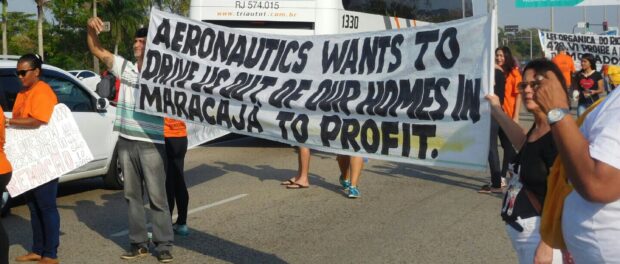
The families of Maracajás Road held their second protest early on Wednesday, October 11 on the main street leading to Rio de Janeiro’s international airport, situated a short walk from their homes on Ilha do Governador. Under immediate threat of eviction by the neighboring Aeronáutica, a military branch related to the Air Force which is believed to be eyeing the land to sell to a private hospital, residents have quickly mobilized and have gained visibility through organized protest, legal processes, and social media activism. Wednesday morning’s act was their second call to action, aiming in part to catch the attention of foreign tourists arriving to Rio on early morning flights. Residents were happy with its outcome.
“The protest is going really well. All of the protests have had the necessary effect, allowing us to call the attention of the authorities, the TV and radio stations,” reflected resistance organizer Anderson dos Santos Pereira.
After their first protest in Galeão, the community received a flurry of media attention. While O Globo focused heavily on the resistance efforts’ toll on traffic, other news outlets have taken a more responsive approach. TV Record aired a full video report two days in a row, emphasizing how some residents have lived on Maracajás Road for decades (since before the arrival of the Aeronáutica’s base), highlighting the total absence of compensation, and discussing the private hospital chain’s interest in the land. Agência Brasil published an article that situates these latest eviction threats in the context of a trend of “selective” removals—removing two or three families at at time—across Ilha do Governador since the privatization of the Galeão International Airport in 2013. This report also confirms that, according to the Aeronáutica, the land in question is federal land currently under the administration of the Aeronáutica, which filed for “repossession” of the land with the federal court.
On Facebook, residents of Maracajás and activists from Vila Autódromo, Horto, and Rio das Pedras are producing their own media too. In one widely viewed video, residents of Rio das Pedras linked the threats facing their own neighborhood to the more imminent threats facing Maracajás, saying, “what’s happening here [in Maracajás] is our tomorrow, if we don’t fight it.” They called for a united movement among communities to help each other resist removal, while Vila Autódromo’s Maria da Penha led the group in chants of: “Aeronáutica, respect the families’ rights!”
The Maracajás group has also caught the attention of City and State government officials, bolstering their resistance efforts. “After we started the protests, I was invited by the State Secretary for Human Rights and Policy for Women and the Elderly to talk about what’s happening with the families here,” dos Santos Pereira stated about an upcoming meeting. Their hopes are that the attention will hold off the Aeronáutica’s pending threats. On Facebook, however, residents are citing October 18 as a possible first eviction date for three families. Still, the families are continuing to organize effectively and quickly, making connections and pushing legal arguments to the forefront, citing the city’s Organic Law’s stipulations against the removal of low-income families. As a recent public Facebook post states, they are asking for support from all residents of the region, as “the other sixty houses and families of Maracajás Road could be the next victims of this cruelty.”


